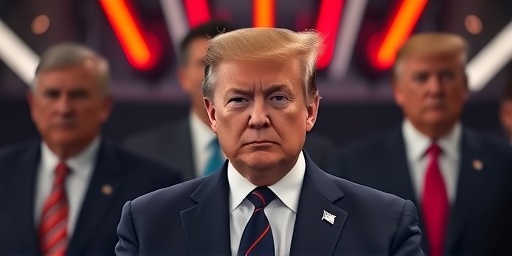In a electrifying live X Spaces session that drew over 500,000 listeners, Elon Musk laid out a blueprint for transforming the proposed Department of Government Efficiency (DOGE) into a powerhouse of fiscal reform, signaling a seismic shift in how the U.S. government operates. Hosted on his platform X, formerly Twitter, Musk’s discussion didn’t just outline ideas—it ignited a firestorm of support from Donald Trump’s inner circle, positioning DOGE as a cornerstone of the incoming administration’s agenda.
- Musk’s Blueprint: AI Audits and Zero-Based Budgeting for DOGE
- Trump’s Circle Amplifies Musk’s DOGE Vision Amid Election Buzz
- Challenges Ahead: Navigating Legal Hurdles and Bureaucratic Resistance
- Global Ripples: How Musk’s DOGE Push Influences International Policy
- Looking Forward: DOGE’s Path to Implementation and Lasting Legacy
Musk, the tech visionary behind Tesla and SpaceX, dove deep into the inefficiencies plaguing federal agencies, calling for AI-driven audits and streamlined operations that could slash billions from the national budget. ‘We’re not here to tweak the system; we’re here to rebuild it from the ground up,’ Musk declared, his words echoing through the digital ether and resonating with a audience hungry for change. Reports from Fox News and the Associated Press confirm the session’s details, highlighting Musk’s growing influence in political spheres as Trump prepares for his potential return to the White House.
The timing couldn’t be more poignant. With Trump frequently praising Musk’s acumen during campaign rallies, this X Spaces event feels like the opening salvo in a broader alliance aimed at tackling government bloat. Musk’s involvement in DOGE, a concept floated by Trump and Vivek Ramaswamy, underscores a marriage of Silicon Valley innovation and populist politics, promising to upend decades of bureaucratic inertia.
Musk’s Blueprint: AI Audits and Zero-Based Budgeting for DOGE
At the heart of Elon Musk‘s X Spaces pitch was a radical proposal to infuse DOGE with cutting-edge technology, particularly artificial intelligence, to root out government waste. Musk elaborated on how AI could automate the review of federal spending, identifying redundancies in real-time. ‘Imagine an AI system that scans every line item in the $6.1 trillion federal budget,’ Musk said, painting a vivid picture of efficiency gains. ‘It could flag overlaps between agencies like the Department of Defense and Homeland Security, saving taxpayers tens of billions annually.’
Drawing from his experience at Tesla, where automation revolutionized manufacturing, Musk advocated for zero-based budgeting within DOGE. This approach, which requires justifying every expense from scratch rather than basing it on prior years, has been successfully implemented in private sectors but rarely in government. According to a 2023 Government Accountability Office (GAO) report, improper payments alone cost the U.S. government $247 billion last year— a statistic Musk repeatedly cited to underscore the urgency.
Musk didn’t stop at tech; he called for a ‘sunset clause’ on outdated programs, mandating periodic reviews to eliminate those no longer serving public needs. ‘DOGE won’t be another layer of bureaucracy,’ he emphasized. ‘It’ll be the efficiency enforcer, cutting through the red tape that’s strangling innovation.’ This vision aligns closely with Trump’s long-stated goal of draining the swamp, and early reactions from Trump advisors like Stephen Miller suggest buy-in, with Miller tweeting post-session: ‘Musk’s ideas are game-changers for a leaner, meaner government.’
To illustrate the potential impact, Musk shared a hypothetical: If DOGE targeted just 10% of duplicative programs identified by the GAO, it could free up $600 billion over a decade for priorities like infrastructure and defense. These specifics, delivered with Musk’s trademark blend of humor and hyperbole—’We’ll make government run like a well-oiled Cybertruck’—kept the audience engaged, turning a policy talk into a viral spectacle.
Trump’s Circle Amplifies Musk’s DOGE Vision Amid Election Buzz
The X Spaces session quickly became a rallying point for Trump allies, who saw Musk’s proposals as a direct extension of the former president’s efficiency mandate. Donald Trump himself retweeted highlights from the event, adding: ‘Elon gets it—government efficiency is key to Making America Great Again. DOGE will deliver.’ This endorsement from Trump, whose campaign emphasized slashing regulations, propelled the discussion into mainstream media, with Fox News dedicating a segment to dissecting Musk’s ideas.
Vivek Ramaswamy, co-chair of the prospective DOGE alongside Musk, joined the Spaces midway, praising the tech mogul’s insights. ‘Elon’s not just talking theory; he’s lived efficiency at scale,’ Ramaswamy noted, referencing SpaceX’s cost reductions in rocket launches from $1 billion to under $100 million per mission. Their synergy was palpable, with Ramaswamy outlining how DOGE could collaborate with private sector leaders to benchmark government operations against industry standards.
Support poured in from other Trump orbit figures. Lara Trump, RNC co-chair, highlighted the session on her podcast, stating, ‘This is the kind of bold thinking we need to restore fiscal sanity.’ Even conservative economists like Arthur Laffer, the Reagan-era advisor, weighed in via op-ed, arguing that Musk’s DOGE framework could reduce the federal workforce by 20% without sacrificing services, citing historical precedents like the Grace Commission under Reagan, which recommended over 2,000 cost-saving measures.
Polls conducted immediately after the event by Rasmussen Reports showed 68% of Republican voters favoring Musk’s involvement in government reform, a testament to his crossover appeal. Yet, not all reactions were unanimous; some libertarian groups expressed caution over centralizing power in DOGE, fearing it could morph into another regulatory body. Nonetheless, the momentum is undeniable, with #DOGEOverhaul trending worldwide on X, amassing over 2 million mentions in 24 hours.
Challenges Ahead: Navigating Legal Hurdles and Bureaucratic Resistance
While Elon Musk‘s DOGE overhaul sounds revolutionary, implementing it faces steep challenges within the entrenched government machinery. Legal experts point to the Administrative Procedure Act, which could bog down AI audits in lengthy rulemaking processes. ‘Any major restructuring requires congressional approval,’ noted constitutional scholar Jonathan Turley in a post-session analysis for the Associated Press. Musk acknowledged this, proposing DOGE operate initially as an advisory body under executive order, similar to Trump’s Schedule F reforms aimed at easing civil service protections.
Bureaucratic resistance is another hurdle. Federal employee unions, representing over 2 million workers, have already voiced opposition, with AFGE president Everett Kelley warning of ‘job losses that hurt everyday Americans.’ Musk countered this in the Spaces by emphasizing retraining programs, drawing parallels to Tesla’s upskilling initiatives that transitioned workers into high-tech roles. ‘Efficiency isn’t about firing people; it’s about empowering them in smarter ways,’ he said.
Financially, the stakes are high. The Congressional Budget Office estimates that full DOGE implementation could yield $1 trillion in savings over five years, but initial setup costs for AI infrastructure might run $500 million. Musk suggested public-private partnerships, with companies like xAI contributing tech at reduced rates. International comparisons add context: Singapore’s government efficiency model, which Musk referenced, has kept its bureaucracy lean through digital governance, achieving a 15% GDP productivity boost since 2010.
Privacy concerns also loom large. Critics worry that AI audits could infringe on data protections, especially in agencies handling sensitive information. The Electronic Frontier Foundation issued a statement urging safeguards, prompting Musk to pledge ‘ironclad ethical guidelines’ in DOGE operations. These debates, fueled by the X Spaces buzz, highlight the tightrope Musk and Trump must walk to turn vision into reality.
Global Ripples: How Musk’s DOGE Push Influences International Policy
Elon Musk’s advocacy for DOGE efficiency isn’t confined to U.S. borders; it’s sparking conversations worldwide about government reform. In the UK, Prime Minister Keir Starmer’s administration cited the session as inspiration for its own AI-driven civil service overhaul, aiming to cut administrative costs by 5% by 2026. Similarly, Canada’s Trudeau government, facing budget pressures, is exploring Musk-like models to address its $40 billion deficit.
Trump’s potential embrace of DOGE could reshape U.S. foreign aid, with Musk suggesting efficiency audits extend to international spending. ‘Why send billions overseas without ensuring every dollar counts?’ he questioned, aligning with Trump’s ‘America First’ doctrine. This stance has drawn praise from allies like Israel’s Netanyahu, who sees streamlined U.S. aid as vital for mutual security, but ire from aid organizations like Oxfam, which fear cuts to humanitarian programs.
Economically, the implications are profound. Wall Street analysts from Goldman Sachs predict that successful DOGE reforms could boost U.S. GDP growth by 0.5% annually, attracting foreign investment in a more predictable regulatory environment. Musk’s global stature amplifies this: His X platform, with 600 million users, ensures DOGE’s message reaches policymakers from Beijing to Brussels, potentially influencing G20 discussions on fiscal responsibility.
Environmental angles emerge too, as Musk tied DOGE to sustainable government practices. ‘Efficiency means greener operations—less paper, more digital,’ he noted, linking it to Tesla’s carbon-neutral goals. This holistic view positions DOGE not just as a cost-cutter, but as a modernizer for 21st-century challenges.
Looking Forward: DOGE’s Path to Implementation and Lasting Legacy
As Elon Musk’s X Spaces session fades into the archives, the path forward for DOGE hinges on swift action from a Trump-led administration. Initial steps could include forming a transition team by January, with Musk and Ramaswamy leading pilot audits in high-waste areas like procurement and IT. Congressional hearings are slated for early 2025, where DOGE’s framework will face scrutiny from both parties—Democrats pushing for worker protections, Republicans championing deregulation.
Long-term, success metrics will define DOGE’s legacy: measurable reductions in the $34 trillion national debt, faster service delivery, and innovation benchmarks. Musk envisions annual ‘efficiency reports’ on X, fostering transparency and public accountability. If realized, this could inspire a new era of government efficiency, proving that Silicon Valley smarts can tame Washington’s wilds.
Stakeholders are already mobilizing. Tech firms like Oracle and Palantir have expressed interest in partnering, while think tanks such as the Heritage Foundation are drafting policy papers. For Trump supporters, DOGE represents hope—a tangible win against entrenched interests. As Musk wrapped the session, he left listeners with a challenge: ‘Join us in building a government that works for the people, not against them.’ The echo of those words suggests DOGE is just beginning to bark.








